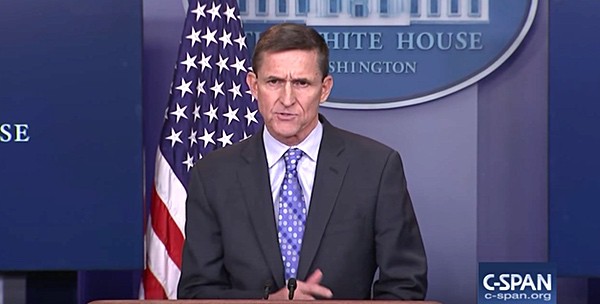
General Michael Flynn resigned as National Security Advisor last night, saying he “inadvertently briefed” Vice President Mike Pence “with incomplete information” regarding phone calls he had with the Russian Ambassador.
Those calls, held before Trump was sworn in, included discussions about sanctions put in place by the Obama administration as punishment for interference in November's elections according to those who had seen a transcript of a wiretap.
Officials said Mr. Pence had told others in the White House that he believed Mr. Flynn lied to him by saying he had not discussed the topic of sanctions on a call with the Russian ambassador in late December. Even the mere discussion of policy — and the apparent attempt to assuage the concerns of an American adversary before Mr. Trump took office — represented a remarkable breach of protocol.
The F.B.I. had been examining Mr. Flynn's phone calls as he came under growing questions about his interactions with Russian officials and his management of the National Security Council. The blackmail risk envisioned by the Justice Department would have stemmed directly from Mr. Flynn's attempt to cover his tracks with his bosses. The Russians knew what had been said on the call; thus, if they wanted Mr. Flynn to do something, they could have threatened to expose the lie if he refused.
RELATED: Rachel Maddow Explains Why The Flynn-Russia Revelations are a Really, Really Big Deal: WATCH
Wrote Flynn in his resignation letter, which the White House released:
In the course of my duties as the incoming National Security Advisor, I held numerous phone calls with foreign counterparts, ministers, and ambassadors. These calls were to facilitate a smooth transition and begin to build the necessary relationships between the President, his advisors and foreign leaders. Such calls are standard practice in any transition of this magnitude.
Unfortunately, because of the fast pace of events, I inadvertently briefed the Vice President Elect and others with incomplete information regarding my phone calls with the Russian Ambassador. I have sincerely apologized to the President and the Vice President, and they have accepted my apology.
Throughout my over thirty three years of honorable military service, and my tenure as the National Security Advisor, I have always performed my duties with the utmost of integrity and honesty to those I have served, to include the President of the United States.
I am tendering my resignation, honored to have served our nation and the American people in such a distinguished way.
I am also extremely honored to have served President Trump, who in just three weeks, has reoriented American foreign policy in fundamental ways to restore America's leadership position in the world.
As I step away once again from serving my nation in this current capacity, I wish to thank President Trump for his personal loyalty, the friendship of those who I worked with throughout the hard fought campaign, the challenging period of transition, and during the early days of his presidency.
I know with the strong leadership of President Donald J. Trump and Vice President Mike Pence and the superb team they are assembling, this team will go down in history as one of the greatest presidencies in U.S. history, and I firmly believe the American people will be well served as they all work together to help Make America Great Again.
RELATED: Trump Evades Questions About Michael Flynn as Top Dems Call for His Firing
The White House said Lt. General Joseph Keith Kellogg, Jr. was replacing Flynn as Acting National Security Advisor
President Donald J. Trump has named Lt. General Joseph Keith Kellogg, Jr. (Ret) as Acting National Security Advisor following the resignation of Lt. General Michael Flynn (Ret). General Kellogg is a decorated veteran of the United States Army, having served from 1967 to 2003, including two tours during the Vietnam War, where he earned the Silver Star, the Bronze Star with “V” device, and the Air Medal with “V” device. He served as the Commander of the 82nd Airborne Division from 1997 to 1998. Prior to his retirement, General Kellogg was Director of the Command, Control, Communications, and Computers Directorate under the Joint Chiefs of Staff.



